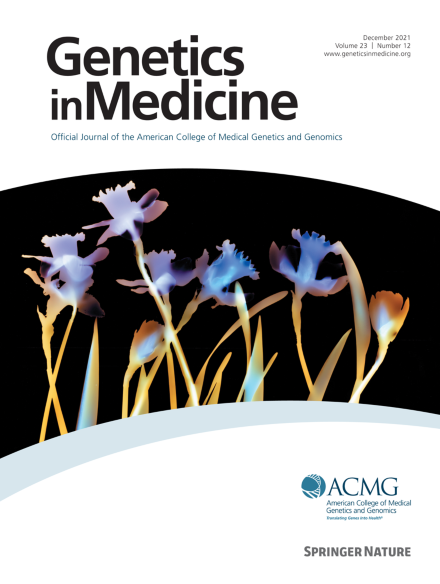Phenylalanine hydroxylase deficiency diagnosis and management: A 2023 evidence-based clinical guideline of the American College of Medical Genetics and Genomics (ACMG)
IF 6.6
1区 医学
Q1 GENETICS & HEREDITY
引用次数: 0
Abstract
Purpose
To replace an existing clinical practice guideline for the diagnosis and management of phenylalanine hydroxylase (PAH) deficiency.
Methods
The PAH Deficiency Guideline Workgroup used the Grading of Recommendations Assessment, Development, and Evaluation evidence-to-decision framework to develop evidence summaries and practice recommendations based on the recent American College of Medical Genetics and Genomics systematic review.
Results
Many recommendations from the 2014 PAH practice guideline are recognized as standard of care in this evidence-based guideline. Key recommendations from the previous guideline that were not supported by strong evidence are now strongly supported; (1) treatment for PAH deficiency should be lifelong for individuals with untreated phenylalanine (Phe) levels >360 μmol/L, (2) individuals with lifelong Phe levels ≤360 μmol/L have better intellectual outcomes than those who do not, (3) achieving Phe levels ≤360 μmol/L before conception is strongly recommended to prevent pregnancy complications and negative outcomes for the offspring, and (4) genetic testing for PAH variants is recommended at birth to confirm diagnosis and guide therapy.
Conclusion
We strongly recommend lifelong maintenance of Phe ≤360 μmol/L (using plasma or whole blood) for optimal intellectual outcomes and for reduced teratogenicity, utilizing all available and necessary dietary, pharmaceutical, and patient-educational modalities.
苯丙氨酸羟化酶缺乏症的诊断和治疗:美国医学遗传与基因组学学会(ACMG) 2023循证临床指南
目的:取代现有的苯丙氨酸羟化酶(PAH)缺乏症诊断和治疗的临床实践指南。方法:多环芳烃缺乏指南工作组使用分级推荐评估、开发和评估证据到决策框架,根据最近美国医学遗传学和基因组学学院的系统综述,制定证据总结和实践建议。结果:2014年多环芳烃实践指南中的许多建议在本循证指南中被认可为护理标准。以前指南中没有得到有力证据支持的关键建议现在得到了有力支持;(1)苯丙氨酸(Phe)水平低于360 μmol/L的个体应终生治疗PAH缺乏症;(2)终生苯丙氨酸水平≤360 μmol/L的个体比未治疗的个体有更好的智力结局;(3)强烈建议孕前苯丙氨酸水平≤360 μmol/L,以防止妊娠并发症和后代的不良结局;(4)建议在出生时进行PAH变异基因检测,以确定诊断和指导治疗。结论:我们强烈建议终生维持Phe≤360 μmol/L(血浆或全血),以获得最佳智力结果和减少致畸性,并利用所有可用和必要的饮食、药物和患者教育方式。
本文章由计算机程序翻译,如有差异,请以英文原文为准。
求助全文
约1分钟内获得全文
求助全文
来源期刊

Genetics in Medicine
医学-遗传学
CiteScore
15.20
自引率
6.80%
发文量
857
审稿时长
1.3 weeks
期刊介绍:
Genetics in Medicine (GIM) is the official journal of the American College of Medical Genetics and Genomics. The journal''s mission is to enhance the knowledge, understanding, and practice of medical genetics and genomics through publications in clinical and laboratory genetics and genomics, including ethical, legal, and social issues as well as public health.
GIM encourages research that combats racism, includes diverse populations and is written by authors from diverse and underrepresented backgrounds.
 求助内容:
求助内容: 应助结果提醒方式:
应助结果提醒方式:


